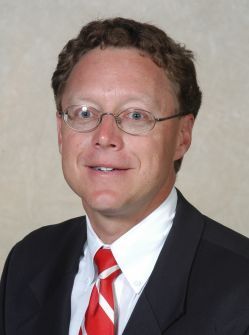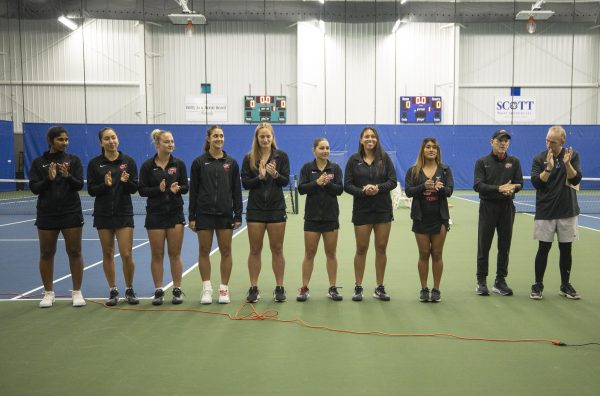Selig’s impact as AD still resonating at WKU
October 23, 2014
Todd Stewart had no intention of becoming WKU’s athletic director when he was hired by the university in 2008 as associate athletic director of communications and media relations.
In fact, he hadn’t worked on a college campus since serving as a graduate assistant at Tennessee in 1990.
“I didn’t really start thinking about becoming an athletic director until after Wood (Selig) left,” Stewart said.
Stewart, WKU’s athletic director since 2012, will welcome back the man who hired him when Wood Selig brings Old Dominion to town to face WKU.
Mayor Bruce Wilkerson has declared Oct. 25 ‘Wood Selig Appreciation Day,’ and the former WKU athletic director and his family will be honored on the field after the first quarter on Saturday.
Selig, who served as director of athletics at WKU from 1999 to 2010, hasn’t been back to Bowling Green in four years.
“I’m very thrilled to be coming back with my wife and three children who really look at Bowling Green as their home because they spent a preponderance of years growing up in Bowling Green,” Selig said. “It’s a very special place, a very special institution and I can not wait to get back and spend a weekend there.”
Former Athletic Director Ross Bjork, currently at Ole Miss, bridged the gap between Selig and Stewart for two years. Much has changed around campus since Selig took the same role at ODU, a school located in Norfolk, Virginia, where Selig was raised.
But it was Selig who set the tone for success that the two following athletic directors have been able to maintain.
“He has a pretty distinguished tenure in which a lot of notable things happened,” Stewart said. “There was success on the field of play, there was success in expansion with (Smith) stadium, Diddle Arena, the track and the Paul Orberson Clubhouse. A lot happened under Wood’s watch, and I’m glad we can recognize him for that.”
Selig’s 11-year tenure is highlighted by the more than $100 million renovation projects that included an additional side to Smith Stadium, an expansion of Diddle Arena and the building of the Charles M. Rueter Track and Field Complex.
WKU won 66 Sun Belt Conference championships and saw the football program move from Division I-AA to I-A in 2007.
Volleyball coach Travis Hudson, who is now in his 20th year of coaching at WKU, said the improvements of the facilities were a direct result of Selig’s push for upgrading facilities.
Hudson’s Lady Toppers made their first NCAA tournament appearance in 2002 and cracked the top 25 during Selig’s tenure.
“He would always say recruits buy with their eyes,” Hudson said. “Meaning they need to see that you’re trying to compete on a high level. He allowed us, through the work of what they did facilities-wise, to put something out there that I think was competitive with anybody in the country.”
Hudson’s time at WKU started in 1995 with Selig arriving on the Hill a few years later. The coach said when Selig stepped in, it didn’t take long to see his passion for expanding the athletic department as a whole.
“It was a real cultural shift within our athletics department,” Hudson said. “The thing that most impressed me about Wood’s time here — and certainly it affected our volleyball program — was he wanted to see everybody succeed. He gave you a chance. Certainly there’s more importance in certain sports than there are in others based on ticket sales and those sorts of things. That didn’t keep him from trying to try to help everyone do what they need to do to achieve success and I always respected him for that.”
Hudson, soccer coach Jason Neidell, swimming coach Bruce Marchionda and track and field coach Eric Jenkins are the only coaches still at WKU since Selig left for ODU. WKU’s major revenue sports have seen all-new faces at the helm of each since Selig’s departure, but he’s still proud of the fact that he had a small part in laying the foundation for the current state of WKU athletics.
“It’s very rewarding to think that you had a small part in that success,” Selig said. “You’re just happy for them individually because they’re such great people and you want to see them continue to have success like they’re having.”














![Students cheer for Senator at Large Jaden Marshall after being announced as the Intercultural Student Engagement Center Senator for the 24th Senate on Wednesday, April 17 in the Senate Chamber in DSU. Ive done everything in my power, Ive said it 100 times, to be for the students, Marshall said. So, not only to win, but to hear that reaction for me by the other students is just something that shows people actually care about me [and] really support me.](https://wkuherald.com/wp-content/uploads/2024/04/jadenmarshall-1200x844.jpg)











